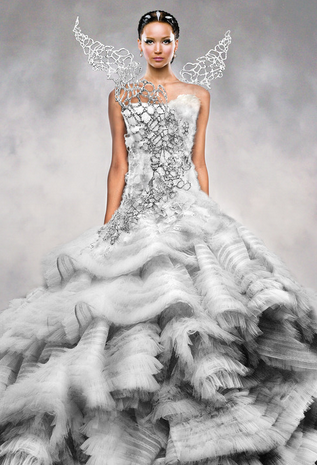As I sat in the movie theater, crying as Katniss addressed Rue's family, snickering as she made the dummy of Seneca Crane, in awe of her beautiful wedding-turned-Mockingjay gown, and anticipating the last movie as the cameras went to an up-close of her face in the last shot, I was sitting there thinking how I wanted to reread the books, and be close with them again.
Until I began reading Falling in Love with Close Reading (Lehman & Roberts, 2014) (2014 copyright date?), I didn't know I was thinking about Close Reading in the wrong way. How I had been thinking of it was like this: teacher asks kids a question about a text, and then ask them to go look for evidence - read closely - to find that evidence.
(Please don't judge me...I feel like I should know more about this since I am, after all, a Literacy Coach.)
But I digress...
But I digress...
Here's what I've learned since beginning this great read - in order to get kids independent with close reading they have to do the close reading the other way. Instead of being prompted with a question, kids need to be taught how to begin looking closely at their own text for their own purposes. For example, after watching Catching Fire, I want to go back to the part where Katniss makes that dummy of Seneca Crane, reread that part, and look for her personality - find places in the text where she gets that attitude about her, which causes her to do the little bow for the suits sitting up on the balcony watching her.
Close reading should look more like this:
First, we have to show students how to choose a lens for what they are looking for. For example, they could choose to look through the lens of what people/characters think/say/do.
The next step, then, is to collect evidence on on a character, making notes about what a particular character thinks/says/does. As I used to tell my middle school students, we read with a pencil in hand, and our Reader's Notebooks close by. As students read, they jot down the things the text says about the character - their actions, their words, their thoughts.
The next step is to look at all the notes they have created - notes which came right from the text. With all that evidence they collect, they can then look for patterns about that character. These patterns will make it easy to form a hypothesis about the character.
This is what reading closely is. It's falling in love with the characters in our books. Following them so closely, watching their every choice and move. It's reading this way because the character is so loved, and we want to be closer to them.
This is why it's important to pick super engaging texts to model this with. The texts we pick have to be about dynamic characters who have to make hard choices. The texts we pick shouldn't be too hard or too boring or too long or too....well anything that would cause students to disengage.
We also don't have to make children do repeated readings of the whole text. We can have them do a first draft reading to get the gist of the text - it's pretty hard to analyze a text when we don't have a vision of the whole thing in our heads. But then, we can ask students to go back and look closely at a small part.
I'm only in the beginning chapters of this book, but I'm already revising my thinking on Close Reading. I'm sure as I read on and try these strategies with students, my ideas will continue to evolve. But, it's easy to think about close reading after watching such a great movie - following a character like Katniss that you admire so much.
How is close reading going for you? Any tips, tricks, or experiences you could share?
Well now I head to the pool, my book in hand. I'm in Arizona for Friendsgiving and have one more day: grabbing some sunshine for a few hours and then sportin school colors down in Tempe for the ASU - U of A game. Big game....if we win we'll have home field advantage for the PAC12 Championship! Plus, we definitely want to beat the Cats anyways for bragging rights!
Hope you're enjoying your Thanksgiving weekend!


















































